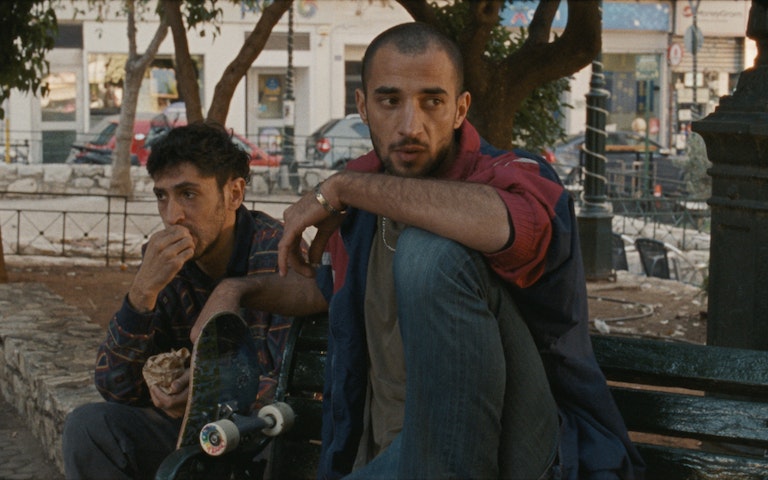Young Critics review: Super Happy Forever

Review by Matheus Felix
When Kohei Igarashi’s Super Happy Forever starts, our protagonist Sano (Hiroki Sano) has his back to the camera. He is in the center of the frame; he wears a white t-shirt; and as another man talks to him he slowly turns his face around, only fully revealing us a profile however, right before the shot is interrupted. He sulks. We don’t need to look at his face to know at just what point he is not super happy: his body, his voice, next to the movie’s over-the-top title, are enough to inform us of his mental state. We don’t know who he is, we don’t know his story, the reason for his suffering—his expression is blank, and he doesn’t shed a single tear—but he moves with such heaviness it’s as if he had to move the whole world in order to take a single step. And still, strangely enough, we are reminded of a ghost.
And that’s not just because of the large white t-shirt hanging over his black jeans: no, it’s because we have the feeling that for him going through a wall would be just as hard as answering a yes or no question. His legs weigh a thousand pounds, yet they don’t seem to touch the ground. And with his every action we fear that not only he could float away and vanish, but that, just as the laws of gravity don’t apply to him, he could forgo the laws of society and assault the very next person to look him in the eyes.
Around him, Japan bathes in the saturated light of the last days of summer, the blue of the ocean loses itself into the blue of the sky, and the vegetation is of the richest green. Yet he is blind to nature’s spectacle; his eyes are entirely turned to the past.
Things are revealed little by little. Through a phone-call, we understand he’s separated from his wife. Then, when he asks at the hotel reception for a red cap lost there five years ago, we understand he’s revisiting the past. And, finally, when the friend that accompanies him recognizes on two women’s fingers the same ring he himself is wearing—a ring given to attendees of a self-help seminar, called (in english) “Super Happy Forever”—we are given the last piece of the puzzle: he’s separated from his wife, yes, but because she’s dead.
A death explains a lot. His sudden burst of energy upon seeing the red cap inside of an abandoned restaurant—energy that, precisely, makes the walls regain their tangibility, forcing him to again break out of them, re-introducing him to the world—this burst of energy to recuperate a mere object, is comprehensible once we know he’s lost something that can never be recuperated. He climbs a gate and enters the restaurant through a window; the red cap was actually just an apron; his body returns to its previous ghost-like state, to its apathy.
It gets dark. And now more than ever, it is of a ghost that we think. That’s when, aptly enough, as if the movie were reading our thoughts—as if it wasn’t merely showing us something, but thinking along with us—a character tells a ghost story...
The movie breaks. We go back five years. By now we are well aware of what has happened, so much so that we wonder if this return was actually necessary; are we just going to visualize what we have just been told? Silly concern. So what if the events are already known to us, we are not watching the movie for the information it’ll give us. Now we see them reenacted, we see, therefore, them happening. What were but words become concrete gestures. What was but a name becomes a face, a voice, a body. We compare the name to this person now before us, and we realize we didn’t know anything about her. No, we hadn’t seen anything. How much does a gesture surpass an account! How much does life exceed our knowledge. Someone almost dropping a cell-phone, hashish balanced on top of an instant noodle cup, a red cap that gets lost somewhere on the way: we shouldn’t have looked for life in the big narratives, but in the smallest of moments.
We compare him with his past self. The skies are the same, the trees are just as green and the sun shines just as brightly; still, there—in the present—he’s lost to life, here—in the past—everything is full of promise. What has changed? Past or present, joy or sadness, Igarashi frames them in the same wide and long shots, preferring to give the actors space rather than abusing their figures and torturing their faces in order to transmit a feeling or an idea. He doesn’t attempt to film the characters’ head-spaces; whatever it is they feel, it is only in simple, enigmatic gestures that we can find it. The only thing that has changed is Sano’s eyes, now tainted with sadness. An overwhelming melancholia dominates the movie even in its most joyful moments.
In the past, everything was still to be done, and therefore full of hope. Now, everything is over and we shall never go back. “Somewhere beyond the sea,” sings Bobby Darin in the song that punctuates the movie like a knife puncturing, again and again, the same open wound. Somewhere, beyond a doubt, we know it is there, and that it shall forever be; but we also know we shall only get there once we finally stop sailing: no more.
Matheus Felix Melchioretto
Brazilian (although, as Carlos Drummond de Andrade said, it’s not certain such a thing exists). Graduated in Anthropology (though not an anthropologist). Currently translating the works of Charles Péguy. At some point of his youth decided for cinema.


